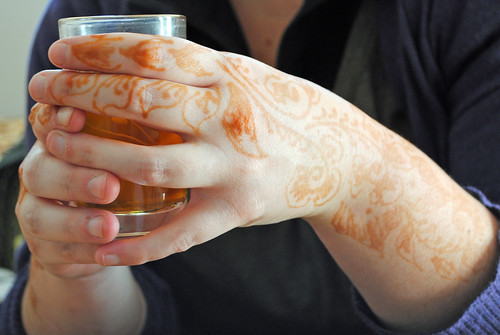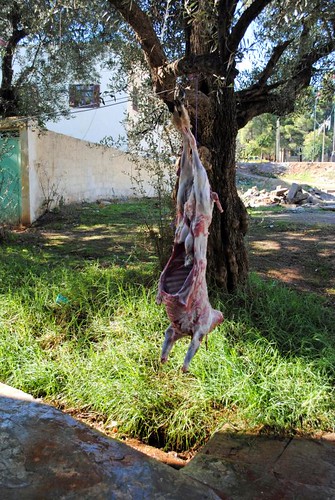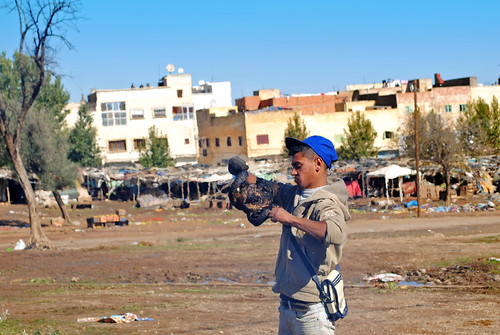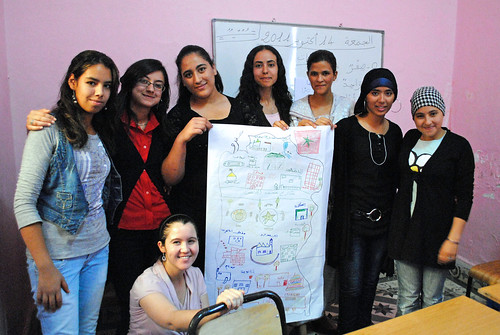During my first month in Morocco, everything was new. New country, new friends, new language, new family – everything was new and different, and it wasn’t until my second month that I started to find my footing and feel at home in Morocco. Part of it was just exposure to the culture and after two months here, I had learned my way around Sefrou, my CBT town, and knew my host family’s routines.
Part of it was my increasing language skills. As the month and my Darija ability progressed, I started going beyond basic fact-based statements (today, we ate tagine for lunch) into a little more depth (today, we ate French fries for lunch, but I ate my French fries with a fork, because I don’t like to eat French fries with bread like Moroccans). During my last week in Sefrou, my host-sisters and I had a conversation about why Americans are fat and Moroccans aren’t, even though Moroccans eat way more bread than Americans do. Being able to actually commutate, no matter how grammatically incorrect that communication might be, has done a lot to make me feel more comfortable.
My host family was wonderful, and put up with a lot of terrible Darija in an attempt to make me feel at home. Simo, my host brother, and I had a running joke where he told people he was from America. It started when Simo was playing a driving and shooting computer game and one of the levels was set in America. I told Simo he was violated American traffic laws. He told me he wasn’t. I reminded him that I was, in fact, from America and was quite familiar with American traffic laws, especially the ones involving not running a red light to ram a cop car, and Simo informed Soukayna and I that he was actually from America.
“Oh yeah,” I said. “Which state are you from?”
“I’m from Florida!” he told me.
“Which city are you from?” Soukayna asked.
Simo, not knowing any cities in Florida, leaned over and whispered to me, “What’s a city in Florida?”
“Miami,” I whispered back.
“I’m from Miami, Florida,” Simo informed us, and that night at dinner he told the rest of the family that he was now from Miami, Florida, and continued to remind us for the next few weeks. A week or so later, my host mother made me a separate pot of tea with dinner because she knew I like my tea without sugar. Simo poured himself a cup from my teapot, took a sip expecting the saccharine mint tea Moroccans usually drink and immediately started gagging.
“What’s the problem?” I asked. “You’re from America. This is American tea.”
“You are from America, right?” his sisters chimed in.
“Yes, I’m from America. I can drink American tea,” Simo reassured us, bug-eyed, then took a tiny sip of my tea and a giant spoonful of jam to prove it. His sisters stole the jam and demanded that he keep drinking. Poor kid. No one deserves to suddenly get an extra older sister.

Simo, tiny Moroccan thug, and my sitemate Jenn. Just before this picture was taken, Simo was disco dancing. Americans disco dance, right?
l-عid l-kbir, biggest holiday in the Islamic calendar, was in early November and I celebrated with my host family. I thought the most important holiday was Ramadan, or would at least involve the Prophet, but l-عid celebrates Ibrahim’s (Abraham) willingness to sacrifice his son, Ishmael. At the last minute, Allah replaced Ishmael with a sheep, saving his life. Now, on the tenth day of the last month in the Islamic calendar (du l-Hijja), Muslims have a sacrificial feast to commemorate the occasion.
My family slaughtered a sheep. The sheep spent the night in the front hallway (which is in between the bathroom and the rest of the house, which made for an unexpectedly exciting late night trip to the bathroom), and on the morning of l-عid, my host father and sister killed it, skinned it and gutted it in front of the house. I stood on the front step and watched. The entire sheep is eaten during the holiday, and until a few weeks ago, I didn’t even know it was possible to eat a sheep’s face. I had already told my host family that I was vegetarian (they tried to convince me that lung and heart don’t count as meat) so I mostly ate bread that week, but my sitemate Kim ate an eye and was tricked into eating sheep testicles. Her host mother offered her some meat that looked like fat, and Kim asked what part of the sheep it was from. Her host mother patted her stomach, but once Kim had eaten it, she leaned over and swung her hands back and forth like a pendulum to explain that actually, it came from a little bit further south.

During l-عid, it's traditional to decorate your hands and feet with henna to ward off evil spirits. The day before l-عid, Naعima came over and drew henna on my hands. It's drawn free-hand with a syringe, which makes the results even more impressive.

The final product of the henna with a glass of mint tea. It's my iconic Moroccan photo.

My family's sheep hanging from a tree over the irrigation ditch in front of our house after it had been skinned and gutted.

After it was decapitated, the sheep's head was taken to a fire pit where a couple of guys cut off the horns and roasted it. You know, for the eating.
During month two, we started doing technical training at the Dar Šabab, which also helped make me feel at home in Morocco. We started the month by doing PACA activities with the kids. (PACA, Participatory Approach for Community Action, is the Peace Corps guide to community analysis. It’s about as interesting as it sounds.) Then we spent a week teaching English at the Dar Šabab, and we ended the month by holding a “camp” for the youth. I’m not sure how much help the activities were in terms of actual technical training — two 40 minute classes does not a teacher make, and the camp was held right after l-عid and was sparsely attended — but it was a great chance to meet and interact with the youth of our town.
The camp was supposed to be the big, final project in CBT, but it fell flat. Not only did we not have nearly enough time to plan for it and only a few interested youth, our original idea for the camp, a talent show/art exhibition, didn’t go over well, so we mostly just hung out at the Dar Šabab and talked with the kids. One of the boys taught me know to write my name in Arabic, Mariam helped me review my numbers and, pressured to sing, I sang Amazing Grace, because it turns out the only songs I know well enough to sing a-capella are either religious or patriotic. On the last day, the youth performed a variety show (like a talent show, but without the practice) with song, dance, poetry and skits. They were a great group of kids, and I hope they get a permanent volunteer soon.

Girls (and Kelly) at the Dar Šabab after making a community map, one of the PACA activities.
I went to a bunch of parties during month two. There was a birthday party for Fatima (my LCF), a Moroccan dance party at Hub, and a going away party my last night in Sefrou. Turns out, Moroccans like to dance a lot. At the two parties in Sefrou, we danced to music videos (both of traditional Moroccan music and more western music, including something that sounded almost like Gangsta's Paradise). Men weren’t invited to either party, so the women were free to shed some of their layers, take off their headscarves and have fun. The day after Fatima’s birthday party, we were discussing it in class, and learned that in Darija, there are two words for to dance: shth which means to dance and rdih which means to crazy dance.
For the dance party at Hub, Peace Corps hired a traditional Moroccan band (like the ones that play at weddings). The band consisted of drums and horns, and the songs were long - up to twenty minutes long. After each piece, the performers had to rest and catch their breath before starting to play again. Everyone joined hands in a circle around the band and danced around in a circle.
Everybody, shthu!
Despite all the fun I had and progress I made during my second month here, most of the month was overshadowed by an abrupt change in LCFs. Due to a dispute with Peace Corps, Fatima had to resign with three weeks left in training. Her departure was sudden and perhaps not handled as well as it could have been by everyone involved, and the experience left me with the impression that the well-being of my training was very much secondary to Peace Corps. While another LCF was eventually brought in, I know that my training, especially my language training, suffered a result. It was an unsettling introduction to how Peace Corps bureaucracy works, but it’s behind me now and I hope the rest of my service is smoother.

No comments:
Post a Comment